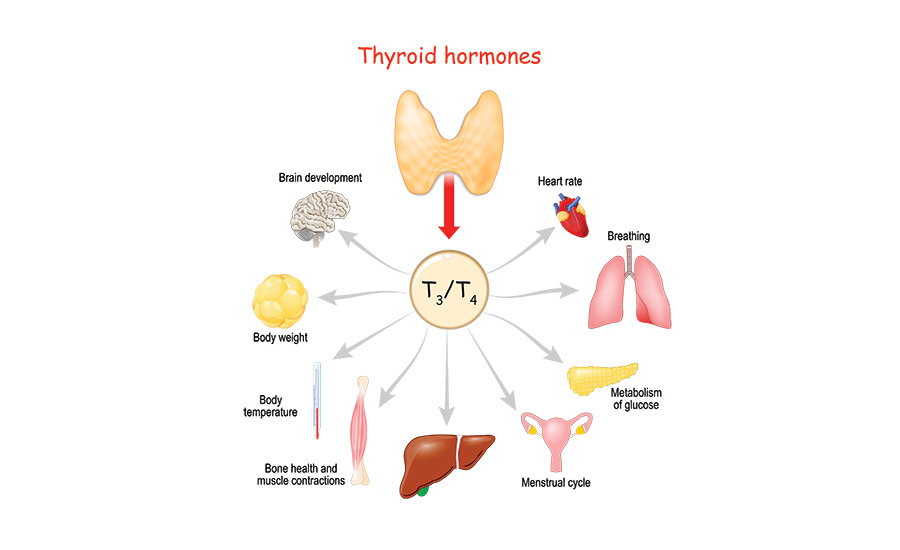
Seeing Is Believing: The Benefits of Ultrasound for Patients and Providers

Thyroid & Metabolism: The Missing Connection
Thyroid & Metabolism: The Missing Connection
You’re eating clean, exercising regularly, maybe even tracking your calories — yet your body feels like it’s stuck in slow motion. The scale barely moves, your energy dips midday, and no amount of caffeine seems to wake you up.
If that sounds familiar, your thyroid might be the silent culprit. This tiny, butterfly-shaped gland in your neck could be the missing link between how you think your metabolism should work and how it actually does.

The Engine Room of Your Body
Your thyroid is small, but it runs a big operation. It produces two essential hormones — thyroxine (T4) and triiodothyronine (T3) — that act like your body’s metabolic thermostat.
T4 is the storage form, while T3 is the active version — the one that tells your cells how fast to convert fuel (food) into energy. Together, they regulate your basal metabolic rate — how quickly your body burns calories, produces heat, digests food, and even how fast your heart beats.
When your thyroid isn’t functioning properly, this whole system can slow down or speed up dramatically.
Too little hormone (Hypothyroidism): Your metabolism drags. You may gain weight easily, feel tired, constipated, or unusually cold.
Too much hormone (Hyperthyroidism): Your metabolism revs too high. You might lose weight without trying, feel anxious, sweat excessively, or experience a racing heart.
Most people focus on diet, workouts, or supplements to “boost metabolism,” but the truth is — if your thyroid isn’t balanced, none of those efforts will move the needle much.
Why So Many People Miss the Signs
Modern lifestyles don’t make it easy to spot thyroid issues. Fatigue, weight changes, or mood swings get blamed on stress, lack of sleep, or aging. But here’s the catch: thyroid dysfunction can mimic all those things.
For example:
A sluggish thyroid can cause elevated cholesterol levels because it slows fat metabolism.
It can interfere with blood sugar regulation, making it harder to lose fat even when you’re eating well.
It can lower mood and motivation — so you might feel “lazy” when you’re actually hormonally off-balance.
The scary part? Many people get only a single TSH test during checkups. That number doesn’t tell the full story. For a clearer picture, you need a full thyroid panel that includes Free T4, Free T3, and thyroid antibodies.
The Real Impact: It’s Not Just About Weight
When your thyroid is off, everything feels off. It’s not just a number on the scale — it’s how alive you feel. Metabolic slowdown means your body isn’t converting nutrients efficiently. You might eat a balanced meal and still feel sluggish an hour later.
Thyroid health also affects:
Heart function — metabolism drives how hard and how fast your heart works.
Digestive rhythm — too little hormone slows your gut, leading to bloating or constipation.
Temperature regulation — cold hands, feet, or intolerance to cold can hint at low thyroid activity.
Mood and cognition — both overactive and underactive thyroid can lead to anxiety, brain fog, or depression.
When you address thyroid health, metabolism isn’t the only thing that improves — your overall vitality, mental clarity, and emotional stability follow.
Supporting Your Thyroid Naturally
If you suspect your thyroid is under strain, don’t rush to self-diagnose. Instead, combine testing with supportive lifestyle changes that help your thyroid and metabolism work together again.
1. Get Proper Testing
Ask your doctor for a full panel — TSH, Free T4, Free T3, and thyroid antibodies. Many “borderline” cases are missed because only TSH is tested.
2. Nourish the Gland
The thyroid depends on key nutrients:
Iodine (in moderation — too much can harm)
Selenium, found in Brazil nuts and seafood
Zinc, from eggs, pumpkin seeds, or lean meats
3. Manage Stress and Sleep
Cortisol (the stress hormone) can interfere with thyroid hormone conversion. Chronic stress = sluggish metabolism. Quality sleep helps the body reset those hormone pathways.
4. Exercise Smart
Moderate movement (like brisk walking, swimming, or light strength training) can boost metabolism without overloading the system. If you have thyroid issues, intense workouts might backfire until your hormones stabilize.
Why This Connection Matters
The biggest myth about metabolism is that it’s all about willpower. Eat less, move more — that’s what we’re told. But real metabolic health is about balance, not punishment.
When your thyroid works in harmony, your metabolism flows naturally. You have consistent energy, stable weight, sharper focus, and a better sense of well-being. When it doesn’t, everything feels like a struggle — even when you’re “doing everything right.”
The Bottom Line
Your thyroid and metabolism aren’t separate systems — they’re dance partners. When one misses a beat, the whole rhythm of your body changes.
If your energy, mood, or weight feel “off,” don’t ignore it. Listen to your body’s signals. Get tested, support your thyroid nutritionally, and rebuild your metabolism from the inside out.
For those seeking expert ultrasound services, Atlanta Ultrasound offers quick, efficient, and comprehensive scans. Our team of skilled professionals is dedicated to providing you with the clarity and care you need.
Contact us today to schedule your ultrasound scan and take a decisive step towards understanding your health.
📍 Multiple locations in Metro Atlanta, GA
📞 Contact: 678-590-3300
🌐 Website:www.atlantaultrasound.com
Disclaimer: The content of this blog post, authored by a sonographer, is provided for educational and informational purposes only. It is not intended as medical advice, nor should it substitute for professional medical consultation, diagnosis, or treatment. Always seek the advice of your physician or other qualified health providers with any questions you may have regarding a medical condition or health concerns.
